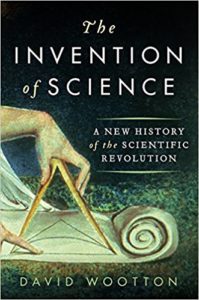 This monster book is actually an easy read because the concepts are not difficult. It is a history of the scientific revolution, which took place in Europe in the decades around 1600. The so-called revolution was a change in world-view among the intelligentsia that developed incrementally, not analogously to a sudden political revolution. The scientific revolution was stealthy and few people recognized it was even happening.
This monster book is actually an easy read because the concepts are not difficult. It is a history of the scientific revolution, which took place in Europe in the decades around 1600. The so-called revolution was a change in world-view among the intelligentsia that developed incrementally, not analogously to a sudden political revolution. The scientific revolution was stealthy and few people recognized it was even happening.
Wootton identifies several events that led to the enormous change in thinking from the middle ages to the modern age. It started in 1572, he says, when astronomer Tycho Brahe observed a supernova. A new star had appeared in the sky, but that was simply not possible. According to Aristotle and everyone since him, the heavens were fixed and eternal. If heaven changed, then religion was called into question, and if you do that, where does it leave us mortal sinners? So a new star in the sky was not conceivable, yet there it was.
Other events that shook up the status quo were the invention of the printing press with movable type, which created communities of like-minded intellectuals faster, and more broadly, than had ever before been possible. Ideas moved quickly and built upon each other rapidly. Today we would call it the network effect. After book printing, individuals who would be the future scientists were known to each other. Before books there were only a few scattered philosophers and crackpots.
The invention of the telescope was huge, of course. Galileo didn’t invent the telescope but he perfected the lenses well enough to be useful for astronomy, and we know how that worked out when he discovered the moons of Jupiter in 1610.
Wootton points out that the microscope was invented at the same time, since if you look into a telescope the wrong way it is essentially a microscope. But the microscope had virtually no influence on the development of scientific thinking at the time because there was no theoretical framework to enclose what was seen. You found incredible, squirming animals in pond water? How charming. It didn’t make any sense because it didn’t fit into any philosophy or theory of the world, so the microscope was ignored as a mere toy until much later. Science is not, and never was, only about observing the world. It has always been about trying to make sense of the world, and if something doesn’t make sense, it just doesn’t count.
Also on the topic of Galileo’s discovery, Wootton makes the interesting point that the churchmen who refused to ‘look for themselves’ through Galileo’s telescope were not being self-defensively stubborn. They did not have our modern conception of what ‘observation’ means. For them, observation meant something like ‘evidence’ and that comes from testimony, as it does in a courtroom. Therefore Aristotle’s and Ptolemy’s evidence that all heavenly bodies revolve around Earth overwhelmed any nonsense a pipsqueak like Galileo might have to say, telescope or not.
Wootton provides many unexpected insights into the history of science, such as revolutionary thinking provoked by the discovery of the perspective effect in painting, the invention of gunpowder, the practice of rubbing garlic on magnets. The pages turn themselves.
One criticism of the book is that it seems to be structured around the discredited Sapir-Whorf hypothesis, that you can’t think about something you have no words for. Wootton goes to great etymological lengths to show that common modern terms, like ‘observation’ and ‘experiment’ had to be invented and defined, true enough, but he attaches a lot more significance to linguistic development than I think is warranted and may even get cause and effect reversed at times.
Along those lines, Wootton does not himself distinguish between observed phenomena and propositions about those phenomena. He seems to think they are the same thing, and he calls phenomena in the natural world “facts,” which is wrong and confusing. A proposition can be true or false, but a rock is just a rock.
Wootton also makes much of the ‘progress’ of science but never defines what that is, a remarkable oversight given his other linguistic obsessions. I infer he means that scientific measurement has become more precise over time and consequently prediction has become more accurate. That is a convincing definition of progress offered near the very end, but throughout the book he writes as though there were more at stake. He repeatedly refers to something called ‘irreversible knowledge’ without defining it, suggesting science progresses in knowledge or truth, which is disputable.
The book is totally Euro-centric. There is little mention of the development of scientific thinking in China, the Arab world, among the Incas, and so on. Maybe there wasn’t any. I doubt that.
The last few chapters concern historiography rather than history and seem tacked on. They are much less satisfying for being cursory, and should have been developed into a separate book.
In the hardback volume there is an entire signature of beautiful color plates, and monochrome figures are presented throughout the book, some of them helpful. The bibliography is extensive (up to about 2004) and the book is well-indexed. Recommended.
Wootton, David (2015). The Invention of Science: A New History of the Scientific Revolution. New York: Harper Collins, 769 pp.
